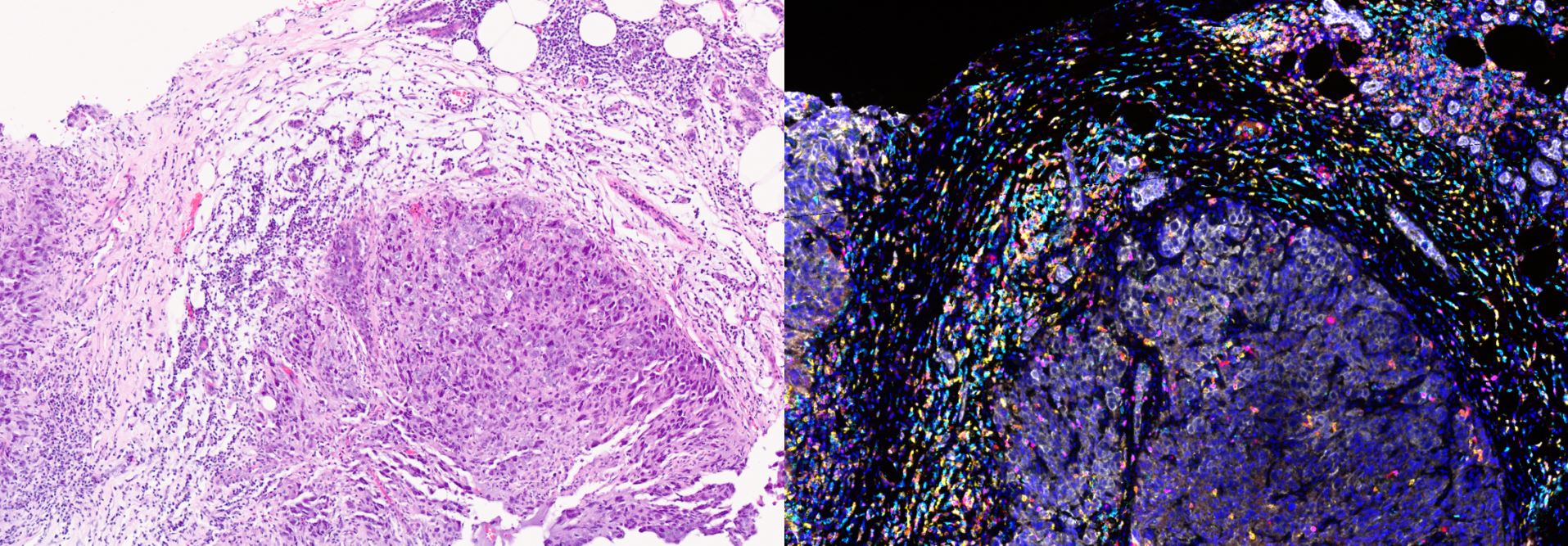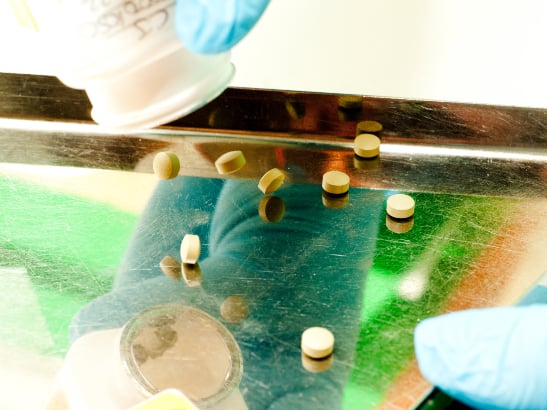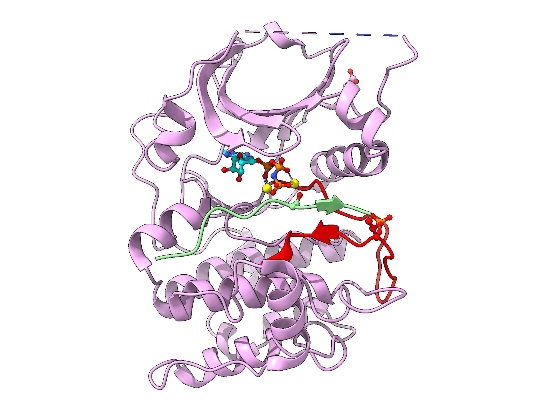Clinical Pharmacology Adaptive Therapy Group
Professor Banerji's group aims to study re-wiring of signal transduction to understand and overcome mechanisms of drug resistance and, in addition, to understand exploit cancer evolution using pharmacological tools.
We are focused on the re-wiring of signal transduction using established cell lines to control mechanisms of drug resistance and comprehend the evolution of cancer.
Rewiring of signal transduction
This group is working on the set-up and validation of a highly sensitive antibody-based assay on the Nanostring platform which will allow quantification of 50 - 100 phosphoproteins/proteins. It plans to digest tumour tissue obtained during surgery or from biopsies and expose them to a matrix of 20 - 30 anticancer drugs before obtaining phosphoproteomic data.
It also aims to use organoids and patient-derived xenografts to take this forward. The proteomic data will be modelled with the Computational Biology and Chemogenomics Team led by Professor Bissan Al-Lazikani. The group also supports PhD students studying the re-wiring of signal transduction in colon cancer and the role of stroma in influencing signal transduction.
The group also currently works with Professor Andrea Sottoriva at the Centre for Evolution and Cancer at the ICR to look at barcoding of cancer cells and the study of evolutionary trajectories of clones under experimental conditions. It is also studying mechanisms of resistance, collateral drug sensitivity and resistance of these emergent clones.
The primary area of this group is focused on the re-wiring of signal transduction using established cell lines as well as fresh cancer cells derived and isolated from patients and then exposing them to novel anticancer drugs. Pre- and post-proteomic profiling provides insights into mechanisms of drug resistance and how to overcome this with combination therapies. The initial work was carried out using cancer cells isolated from ascites and pleural effusions; the group in now developing expertise in organoid and patient-derived xenograft tissue.
The group develops its own antibody-based proteomic platforms and collaborates with teams involved in mass spectroscopic methods, led by Jyoti Choudhary. The group generates significant amounts of data and collaborates with the ICR's Computational Biology and Chemogenomics Team led by Professor Bissan Al-Lazikani to develop and decipher the data.
The secondary focus of this lab is the study of the pharmacological effects on cancer evolution in experimental models and methods to quantify this and herd cancer cells to a vulnerable state.
Professor Banerji works with Professor Andrea Sottoriva in the Centre for Evolution and Cancer at the ICR and plans to translate these concepts in to the clinic.
Professor Udai Banerji
Group Leader:
Clinical Pharmacodynamics Biomarker Group, Clinical Pharmacology & Trials, Clinical Pharmacology Adaptive Therapy Group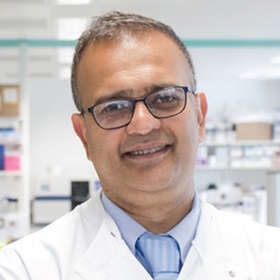
Professor Udai Banerji champions multidisciplinary working at the interface between early phase clinical trials, drug discovery and translational research related to drug resistance. He is Deputy Director of the Drug Development Unit at The ICR and Royal Marsden, and as a key member of the Centre for Cancer Drug Discovery, also heads the Clinical Pharmacodynamics Biomarker Group and the Clinical Pharmacology-Adaptive Therapy Group.
Researchers in this group
Professor Udai Banerji's group have written 138 publications
Most recent new publication 1/2025
See all their publicationsVacancies at the ICR
Working at the ICR
Postdoctoral Training Fellow - Endocrine Control Mechanisms
Under the guidance of Professor Cathrin Brisken, we are seeking a highly motivated and ambitious Postdoctoral Training Fellow to combine innovative patient-derived xenograft models and genetic tools to disentangle the role of estrogen and progesterone receptor signaling in breast cancer. The work contributes to gaining more insights into patient-specific hormone dependencies and factors determining them with the aim of personalizing breast cancer therapy and prevention. The successful candidate will be part of a transdisciplinary team of biologists, clinicians and computational scientists and part of close interactions with groups at the ICR, the RMH and King’s College as well Prof. Brisken’s research group at EPFL, Switzerland. About you The successful candidate must have a PhD in biochemistry, pharmacology, cell or molecular biology and demonstrable experience in planning and designing experiments. Ability to write efficient computer code would is desirable. Candidates who are nearing completion of their PhD may apply, but confirmation on awarded PhD is required within 6 months of employment. The ICR has a workforce agreement stating that Postdoctoral Training Fellows can only be employed for up to 7 years as a PTDF at the ICR ( this includes experience gained at PDTF level prior to joining the ICR). For general information on Postdocs at The ICR, more information can be found here. Research Group Information Under the leadership of Professor Cathrin Brisken, The Endocrine Control Mechanisms group are using intraductal mammary gland implantation, and ex vivo studies using breast cancers expanded via intraductal implantation. We also use transcriptomic and proteomic studies to investigate therapeutics for breast cancer patients and improve the development of novel treatment options for them. Directorate Information The Breast Cancer Now Toby Robins Research Centre, within the Division of Breast Cancer Research of the Institute of Cancer Research which is the first centre in the UK entirely devoted to breast cancer research. Our goal is to advance research into the causes, diagnosis and treatment of breast cancer. It is located in state-of-the-art laboratory space, with excellent core facilities and is funded through a long term renewable programme grant from Breast Cancer Now. The Centre is Directed by Clinician Scientist Professor Andrew Tutt, Professor Chris Lord is Deputy Director of the Centre. What we offer A dynamic and supportive research environment Access to state-of-the-art facilities and professional development opportunities Collaboration with leading researchers in the field Competitive salary and pension We encourage all applicants to access the job pack attached for more detailed information regarding this role.
Postdoctoral Training Fellow
Under the leadership of Claudio Alfieri, we are seeking to appoint a Postdoctoral Training Fellow to join the Molecular Mechanisms of Cell Cycle Regulation Group at the Chester Beatty Laboratories, Fulham Road in London. This project aims to investigate the molecular mechanisms of cell cycle regulation by macromolecular complexes involved in cell proliferation decisions, by combining genome engineering, proteomics and in situ structural biology. For general information on Post Doc's at The ICR can be found here. Key Requirements The successful candidate must have a PhD in cellular biochemistry and experience in Cryo-EM and CLEM is desirable. The ICR has a workforce agreement stating that Postdoctoral Training Fellows can only be employed for up to 7 years as PDTF at the ICR, providing total postdoctoral experience (including previous employment at this level elsewhere) does not exceed 7 years Department/Directorate Information: The candidate will work in the Molecular Mechanisms of Cell Cycle Regulation Group within the ICR Division of Structural Biology headed by Prof. Laurence Pearl and Prof. Sebastian Guettler. The division has state-of-the-art facilities for protein expression and biophysics/x-ray crystallography, in particular the Electron Microscopy Facility is equipped with a Glacios 200kV with Falcon 4i detector with Selectris energy filter and the ICR has access to Krios microscopes via eBIC and the LonCEM consortium. We encourage all applicants to access the job pack attached for more detailed information regarding this role. For an informal discussion regarding the role, please contact Claudio Alfieri via Email on [email protected]
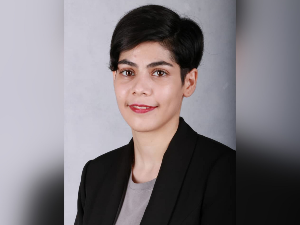
Employee Story
Dr Fatemeh Ahmadi Moughari is a bioinformatician working in the Functional Genomics Team, led by Rachael Natrajan, and the Bioinformatics Team, led by Syed Haider. She joined the ICR from her home country of Iran where she completed her PhD in anti-cancer drug response at Shahid Beheshti University.
"I really enjoy the multidisciplinary atmosphere here and it’s the thing that stood out when I first joined the ICR."
Industrial partnership opportunities with this group
Opportunity: A potent, orally bioavailable clinical-stage inhibitor of MPS1 with potential as a treatment for a range of cancer types including triple negative breast cancer
Commissioner: Swen Hoelder
 .
.
